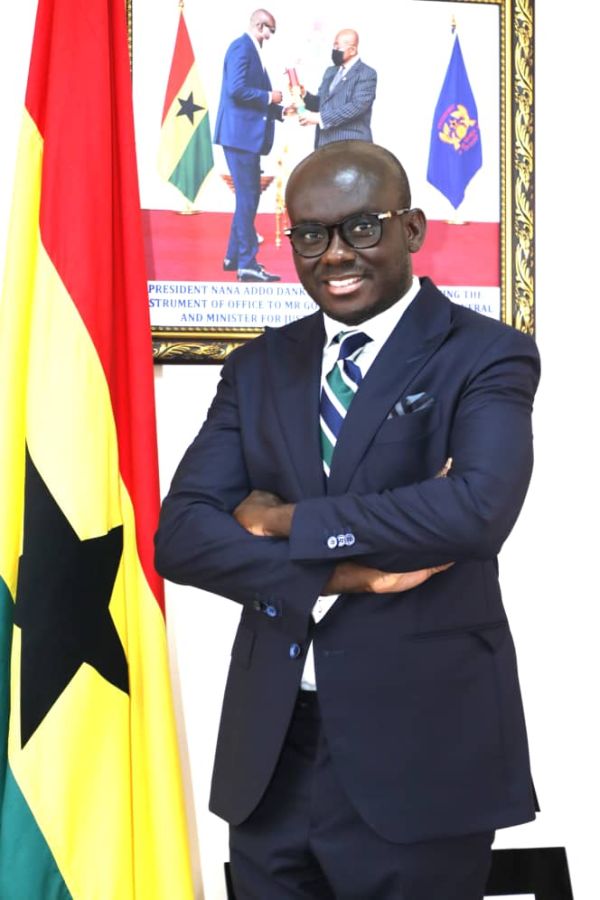The Attorney–General (A-G) and Minister of Justice, Godfred Yeboah Dame, has expressed disagreement with the chorus of calls for a complete overhaul of the 1992 Constitution.
In an exclusive interview with the Daily Graphic to share his views about the Constitution Day celebration and on whether there was the need for a review of the Constitution, he described the 1992 Constitution as possessing all the elements of a good constitution anywhere in the worldwhich assures a sound democratic order.
The Constitution, he said, contained values and principles that met international standards, and had over the past 31 years, entrenched and promoted democracy, human rights and constitutionalism in the country.
Importance of the Constitution
On the importance of a constitution to the life of a nation, the Attorney-General stated that “apart from the Independence struggle, the set of rules by which a nation is governed, represents the single most important document the nation can give to itself. It is that system which defines objectives of the State, institutions established to accomplish those objectives, limitations on the powers of State, the duties of the citizen to the State, the interaction between the State’s powers and the inalienable rights of the citizen. That set of rules is embedded in the Constitution, and we cannot underestimate its significance”.
Is a new Constitution necessary?
Regarding the calls for a reform of review of the Constitution, Mr. Dame noted that “it has become fashionable for people to allege the need for a reform of the Constitution. Some people go as far as saying that Ghana needs a new Constitution. To answer this question, we must examine the relevance of our Constitution to our current national life, and I will be as objective as possible. We must not be unduly influenced popular thinking. We should subject the calls for a change or review of our Constitution to a critical thinking and there must be intellectual honesty in determining whether our Constitution measures up to international standards or the requirements of a democratic order.
When this is done, it will be clear to all that the Constitution of Ghana delivers to the nation the principles of a sound accountable democratic order and measures up to the international standards of a solid Constitution anywhere in the world. It must be realised that the Constitution is the product of decades of constant but peaceful evolution.”
Although he noted the necessity for a review of some of the provisions, as well as a periodic assessment of the constitution, Mr Dame said the regular agitation for constitutional review by sections of the populace, with some even calling for a completely new constitution, were unnecessary.
“Our Constitution is quite strong in terms of the establishment of the institutions to deliver a sound economic and social life. I share the view that rather than overhauling the Constitution, there is the need for us to continue to strengthen the capacity of institutions to hold the Government more accountable and ensure that the right thing is being done,” he said.
Comparison with the Constitution of the United States of America
Buttressing his case for why the Constitution in its current form, can be interpreted and applied in a way which satisfies the aspirations of the people, the Attorney-General stated that “it ought to be noted that the original Constitution of the world’s oldest democracy, the United States of America contained only 6 broad articles spread over 4 pages. Since its adoption in 1787, about 250 years ago, it has undergone only 27 amendments. All in all, it is still nowhere near the size of our Constitution and does not contain a bill of rights as exhaustive and comprehensive as in Ghana. An American constitutional scholar told me, that in Ghana, we seem to have more rights laid out in our Constitution than in America”.
Accountability – the role of the Judiciary
The Attorney-General indicated that the Constitution had responded to the need for accountability in the country by setting up some institutions to control the use of executive power. Two of such institutions were the Judiciary and Parliament. On the Judiciary, Mr Dame cited numerous provisions in the Constitution to explain how the Constitution guaranteed an independent judiciary which was vested with full judicial review powers to ensure that every person or institution was subjected to the Constitution. The Bill of Rights in the Constitution was more elaborate as compared to other countries in the promotion of democracy and protection of fundamental human rights.
The Attorney-General referred to articles 2 and 130 of the Constitution and stated that the mechanism for the exercise of judicial review of executive and legislative actions by the Supreme Court was stronger in Ghana than in most countries. In comparison with the United States, he said judicial review was not specifically spelt out by the American Constitution but had to be assumed by the US Supreme Court through a process of constitutional interpretation.
“Again our judicial review exercised by the Supreme Court of Ghana is better than the concept of judicial review in the United Kingdom where the Supreme Court may pronounce on the consistency of legislation in the UK with a European Convention but does not have the power to pronounce on the legitimacy or lawfulness of an Act of Parliament by virtue of the concept of Parliament supremacy. Ghana lent more towards the United State of America model rather than the more limited kind of judicial review as in the United Kingdom. We also rejected the concept of judicial review in some Eastern and Central European countries, where judicial rulings on the unconstitutionality of legislation may be over-ridden by a prescribed majority of the legislature” the Attorney-General said.
The Principal Legal Adviser to the Government also referred to the comprehensive bill of rights in the 1992 Constitution to protect human rights as another example that set apart the Constitution from others.
“Despite the comprehensive bill of rights in Chapter 5 of the Constitution and other parts of the constitution, the Constitution in Article 33 (5) even states that the human rights provisions are not exhaustive as those not specifically mentioned in the constitution would still be recognised so far as they are intended to secure the freedom and dignity of people,” Mr. Dame said.
Parliament’s role in promotion of accountability
Mr. Dame noted that the Constitution stipulates concrete areas of Parliamentary oversight where Parliament could effectively exercise its powers to scrutinise actions and decisions of the government.
He supported his point by citing numerous provisions in the Constitution. In particular, the Attorney-General referred to Parliament’s constitutional function to approve Ministers and Deputy Ministers of State under article 78 as well as Justices of the Supreme Court in article 144 of the Constitution. He further alluded to some other powers of Parliament such as the approval of the budget under article 179 of the Constitution, the power to impose or vary taxation under article 174, the power to ratify international treaties and agreements under article 75, Parliament’s power to approve loans and international business and economic transactions under article 181, Parliament’s power to approve any transaction or undertaking involving the exploitation of natural resources in the country under article 268, Parliament’s power to appoint an auditor to audit the Auditor-General under article 187 as well as Parliament’s power to appoint committees to conduct investigation and inquiries into the activities of ministries and departments under article 103 of the Constitution. These powers of Parliament, he observed, are already in the Constitution and are capable of placing Parliament in a strong position to curb executive power.
“Indeed, I believe that if Parliament was to be exercising its powers more stringently and appropriately, I am sure that most of the concerns of people regarding the Constitution will be addressed. The failure on the part of Parliament to exercise these oversight responsibilities cannot be attributed to defects in the Constitution.” Mr. Dame said.
Significance of Constitution Day
Mr Dame lauded the celebration of the Constitution Day, which he said was very important as it creates an annual avenue for an examination of the significance of the Constitution in the democratic dispensation of the country.
“It may be necessary at certain critical times to re-examine the effect of the Constitution on our national aspirations. However, it does not mean that every day, every week, every month there should be topics and seminars for reviewing the Constitution. To do so in itself inspires a lack of confidence in the concept of constitutionalism and by extension, our National Constitution.
It is important to clarify that I am not against a review of the Constitution. What I say is that at certain critical points, there ought to be discussions about certain aspects of our Constitution and how it impacts national life. But it ought not to be a regular affair as to entertain such daily or weekly enterprises for the review of the Constitution in itself engenders a certain lack of confidence in our national Constitution. That is why I welcome the institution of the Constitution Day because it provides for us an annual opportunity for us to reflect on the constitution, its benefit, the lapses, and how far we can go to strengthen the constitution.
However, I think in terms of international standards that are required for a constitution to have a sound democratic order, this Constitution clearly satisfy the standards,” he added.
Other views on the need for constitutional reform
The issue of constitutional review has gained momentum in recent times with some constitutional experts, scholars, civil society organisations and trade unions adding their views to the national debate.
While institutions such as the Trade Union Congress (TUC) and constitutional experts such as Sam Okudzeto have called for amendments of various provisions of the Constitution, scholars such Professor Vladimir Antwi-Danso, an international relations expert, have called for a completely new constitution to replace the 1992 Constitution.
Such views for a new constitution have however been rejected by other experts, including former Chief Justice, Justice Sophia Akuffo, who argued that the best approach was to maintain the constitution and amend the parts not fit for purpose.
For eminent constitutional expert, Prof. Nana Susubribi Krobea Boaten (SKB Asante), who is regarded as the architect of the 1992 Constitution, there is even no need for any amendment as a mere amendment of the text of the Constitution, without attitudinal change in line with the values of the constitution, would not necessarily improve the fortunes of the country. Nana SKB Asante also believes in a strengthening of institutions of state and an attitudinal change of our leaders.
Areas of reform of the Constitution
The A-G shared his views on a few significant provisions of the Constitution which, in his view, required “urgent reform” like amendment of articles 78,(1), 11(7), 55 and 243,etc.. In subsequent editions, the Daily Graphic will capture them.
Pull quote
“Rather than overhauling the constitution, there is the need for us to continue to strengthen the capacity of institutions to hold the government more accountable.”
Source: Emmanuel Ebo Hawkson
| Disclaimer: Opinions expressed here are those of the writers and do not reflect those of Peacefmonline.com. Peacefmonline.com accepts no responsibility legal or otherwise for their accuracy of content. Please report any inappropriate content to us, and we will evaluate it as a matter of priority. |
Featured Video


















